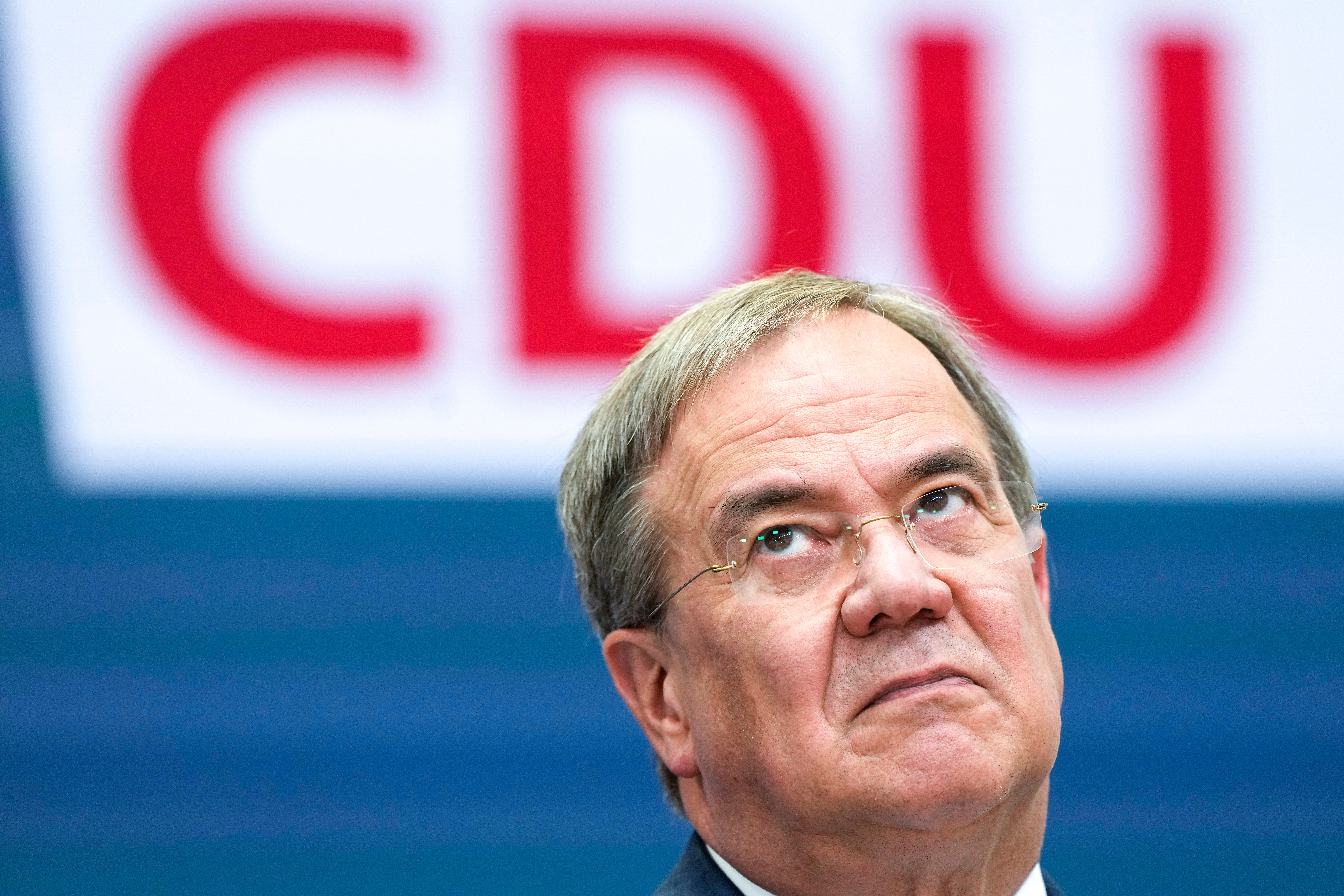German elections: defeated CDU leader Laschet resolves to fight on in bid to form coalition
But the Greens and FDP say they have already started informal talks about whether and with whom they will try to form a coalition

With the tenacity of a sore loser unwilling to accept his party’s crushing electoral defeat, conservative party leader Armin Laschet on Monday pressed on with his long-shot hopes of somehow finding a path to power to lead the next German government – despite ridicule and criticism even from within his own defeated ranks.
Even though the centre-left Social Democrats, led by vice-chancellor Olaf Scholz, beat the Christian Democrats (CDU/CSU) at the ballot box for the first time in 19 years and only the third time in 20 post-war elections going back to 1949, Laschet said he would nevertheless try to form a three-party coalition with two smaller parties – the pro-environment Greens in third place and the pro-business Free Democrats (FDP), who finished fourth.
Laschet’s refusal to concede defeat and his unorthodox grab for power might seem strangely reminiscent of Donald Trump’s courtroom and public battles to remain president in the United States after losing last year’s presidential election. Yet Laschet’s attempt to cling to power despite his party’s worst ever result is entirely legal in Germany and even with precedent.
“We’ve got a clear mandate and we’ll try to form a government under conservative leadership,” Laschet said late on Sunday even though his CDU/CSU finished with 24.1 per cent and behind the SPD (25.7 per cent) in its worst ever result – a drop of 8.8 percentage points from the last election in 2017. He told conservative party leaders at a testy closed-door meeting in Berlin on Monday, according to a report in Bild newspaper, that they should keep trying to form a three-way government because opposition could damage the party. “Olaf Scholz isn’t king,” he said.
Scholz, a centrist finance minister in his left-leaning party, brought the long-suffering Social Democrats back from the dead with an impressive, if colourless, campaign that stole a page from retiring chancellor Angela Merkel’s playbook – stay calm, stay vague and don’t rock the boat. The SPD had fallen to a bleak 14 per cent in opinion polls a year ago when Scholz volunteered to run – to the amusement of friends and foes alike. How could a party with 14 per cent backing ever dream of winning the chancellery? The SPD was still back in third place five weeks ago, according to voter surveys, before rising steadily to the top – in part due to blunders by Laschet and Greens’ candidate Annalena Baerbock.
Scholz brushed aside Laschet’s claims for power and said his SPD was the clear winner. He said he felt it had the mandate to try to form a three-party government with the Greens and FDP. The Greens gained 5.9 percentage points to 14.8 per cent, and the FDP climbed 0.8 points to 11.5 per cent.
“It’s quite clear that we’ve got the mandate to form a government with the parties that saw their shares of the vote rise in this election – the SPD, the Greens and the FDP,” Scholz told party supporters in Berlin. He later responded to Laschet’s reported “king” comments: “Parties that lose elections shouldn’t try to form governments.”
It’s a good idea to first see if the two parties furthest apart in the political spectrum can take a look to see what’s possible
The leader of the Greens, co-chair Robert Habeck, and FDP chairman Christian Lindner said they had already started informal talks about whether and with whom they would try to form a coalition. While they have never been in a federal government together and are fierce rivals for the same sorts of voters – often urban and well-educated who are especially popular among younger voters – both parties realise they hold the keys to power now. The Greens are especially eager to return to government as they have been in opposition since 2005, while the FDP has been in the political wilderness since 2009.
“The parties that want Germany moving away from the status quo are the Greens and FDP – and that’s why it makes sense for us to talk with each other first to see if there’s a possibility of finding a progressive centre for the next government,” Lindner said.
Habeck added at another press conference: “It’s a good idea to first see if the two parties furthest apart in the political spectrum can take a look to see what’s possible.”
When West Germany had just three parties, the SPD twice managed to form a government together with the FDP, even though the CDU/CSU had a larger share of the vote – in 1976, 1980 and 2002 – because the small FDP were kingmakers. The SPD has only finished ahead of the CDU/CSU twice before in post-war election history: in 1972 and 1998.
Subscribe to Independent Premium to bookmark this article
Want to bookmark your favourite articles and stories to read or reference later? Start your Independent Premium subscription today.

Join our commenting forum
Join thought-provoking conversations, follow other Independent readers and see their replies